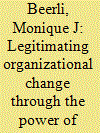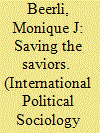|
|
|
Sort Order |
|
|
|
Items / Page
|
|
|
|
|
|
|
| Srl | Item |
| 1 |
ID:
155688


|
|
|
|
|
| Summary/Abstract |
While humanitarian work has always implied a certain level of risk, in the last two decades there has been a growing concern that humanitarian and peacekeeping agents are exposed to unprecedented levels of insecurity. To determine whether or not such claims and perceptions are substantiated, researchers have developed quantitative datasets aimed at measuring and tracking threats to humanitarians and peacekeepers at the global level. In contrast to humanitarian practitioners which use such quantitative expertise to suggest aid work is becoming increasingly dangerous, the producers of quantitative representations of humanitarian security suggest instead that attack rates have remained for the most part fairly stable despite increases in absolute numbers. In order to make sense of this paradox, this article draws on neo-Bourdieusian approaches, the sociology of professions and organizations, as well as global governance literature on quantification to suggest that such inconsistencies relate to the use of quantitative data to legitimate organizational change and bureaucratic restructurations in relation to the institutionalization of security expertise. By understanding the dynamics of organizational change, this article sheds light on one of the ways through which international humanitarianism and peacekeeping is shifting from a paradigm of proximity to a paradigm of distance and remoteness.
|
|
|
|
|
|
|
|
|
|
|
|
|
|
|
|
| 2 |
ID:
151675


|
|
|
|
|
| Summary/Abstract |
Conflict, crime, development, security, human rights, and democracy, to name a few, are all examples of subjects that have been delimited and constructed in the form of databases and sets of quantitative indicators. While the state had traditionally held the exclusive monopoly of quantified production, today many actors participate in its fabrication and circulation, sometimes even working on the same theme. Taking the example of humanitarian security, this article argues for the need to investigate the factors that structure a researcher and a research center's choice to develop new areas of quantitative research. Giving an account of who has the power to count and calling into question the disinterested production of data, this article also points to the wider power effects of transforming insecurity into quantified measures
|
|
|
|
|
|
|
|
|
|
|
|
|
|
|
|
| 3 |
ID:
151672


|
|
|
|
|
| Summary/Abstract |
The articles in this special section argue that, by looking at quantification as a technical and political technique of power, we can effectively engage with newly established types of transnational power and better understand how numbers can enable reconfigurations and hence reorderings of power relations. The section looks at how numbers, in the form of risk assessments, measuring for results, and governance indicators, have a crucial impact in current transnational politics, which in turn influences resource allocation and recognition, discourses on undesirable individuals, possibilities for political leverage, and potential ownership.
|
|
|
|
|
|
|
|
|
|
|
|
|
|
|
|
| 4 |
ID:
158667


|
|
|
|
|
| Summary/Abstract |
Tracing transformations in the way that humanitarian organizations respond to insecurity in the field, this article examines the bureaucratization and professionalization of security in relation to intraorganizational struggles between humanitarian professionals. Whereas some advocate for the triumph of remoteness and bunkerization as organizing principles of humanitarian action, others challenge the imposition of security as a humanitarian logic of practice through acts of nonconformity. These tensions are illustrative of professional struggles over how to do and think humanitarian action. In articulating a sociological and transversal reading, this article points to the heterogeneity and divisions structuring the humanitarian space. To provide empirical insights into the bureaucratic work practices of headquarters professionals and the everyday practices of frontline humanitarian professionals, this article draws upon an analysis of humanitarian security manuals, interviews with humanitarian professionals, and field observations in Port-au-Prince. The article sheds light on the development of the humanitarian profession and on the novelty of the work practices of humanitarian security professionals, while contributing to debates on bunkerization and the literature on transnational professionals.
|
|
|
|
|
|
|
|
|
|
|
|
|
|
|
|
|
|
|
|
|